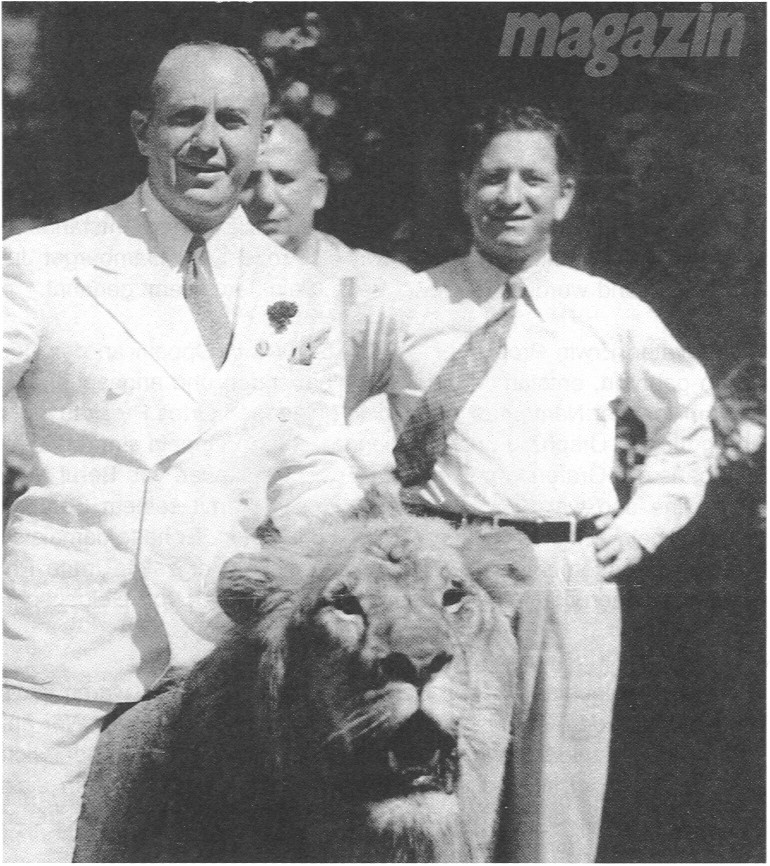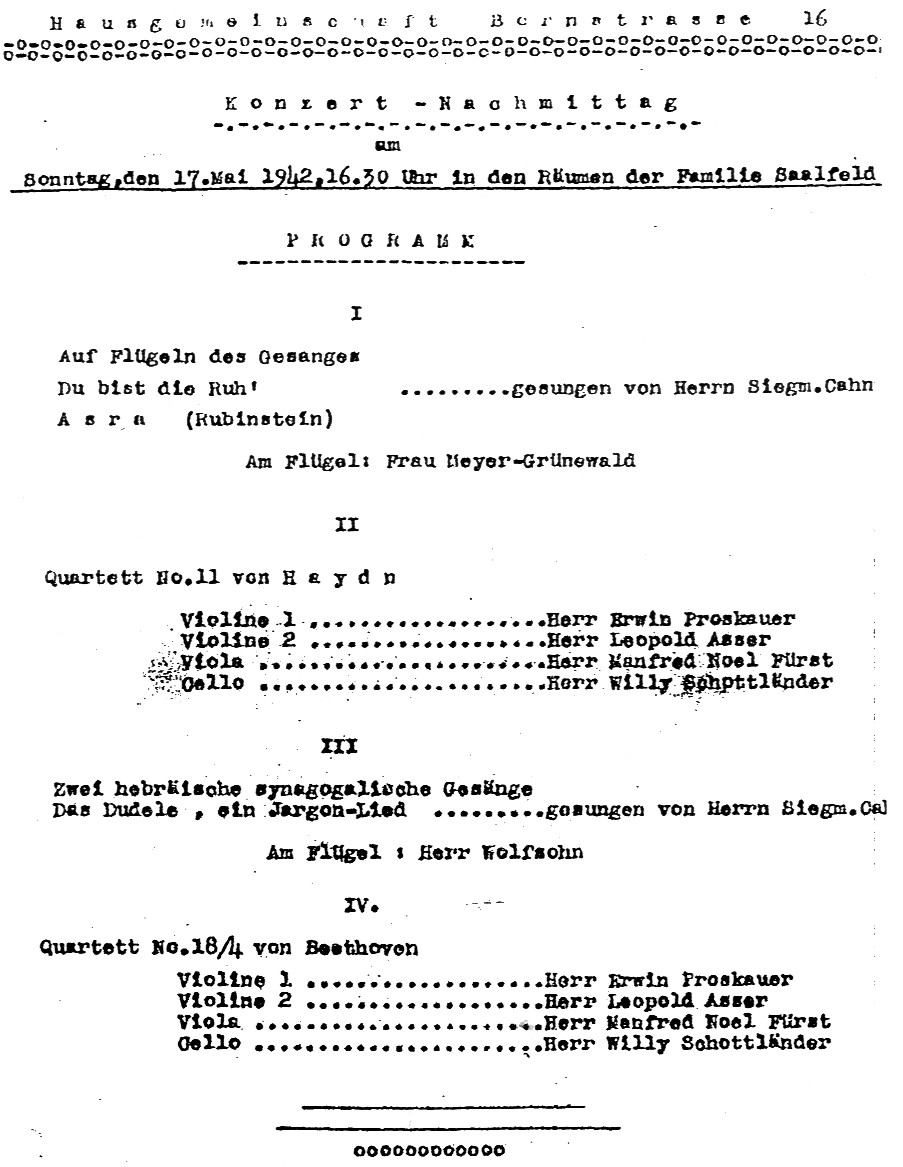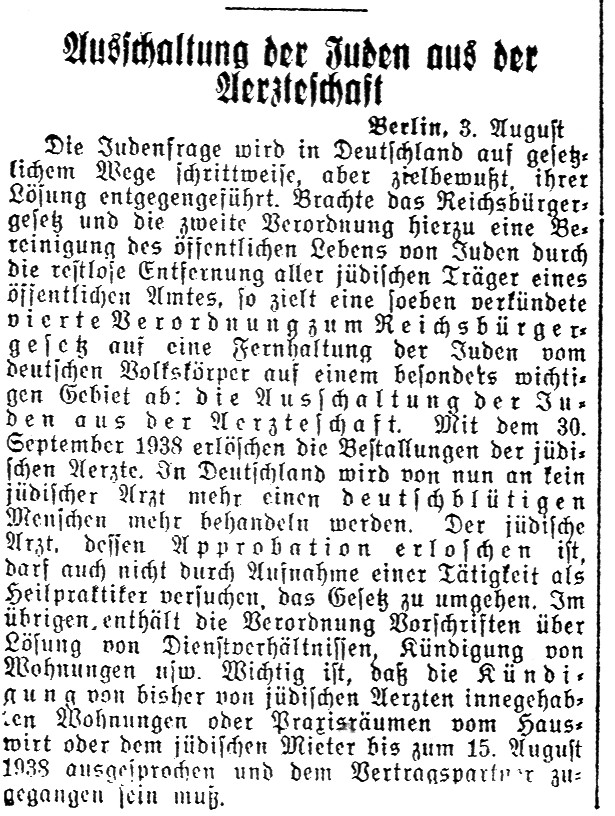
Irene was prepared for the change of foster parents because when Frau Proskauer collected her from the Krause family on 28th November 1941 Irene greeted her: "I know who you are. You're my new foster mummy." At home, the couple noticed the scars straight away. Later, Herr Proskauer told Evi Schneemann, who came from Stade and was a childhood friend of Irene, that he had inquired at the orphanage and received the reply: Irene had climbed onto the window sill, over the safety guard and fallen out of the window. He believed this information because he could not have known that Irene's mother had been arrested as early as July 1938 and that the then one-year-old would not have been capable of climbing so high nor have had the strength to propel herself through a closed window.
The new foster parents lived in Rappstraße 3 in the Grindel district of Hamburg.
The foster father, Erwill Proskauer, born in Oppeln on the Oder in Silesia in 27th June 1893, was descended frorn a wealthy, distinguished Jewish family. (Proskau, the name of a place near Oppeln, explains the origin of the family name. The former town house of the Dukes of Proskau was in Oppeln.) Erwin Proskauer was a professional musician. He played the violin and was conductor of the orchestra. Together with his brother Lutz, he moved from Oppeln to Berlin in order to work as a musician. He had important engagements at that time and also taught violin.
He showed Irene photographs of himself and his two large groups of violin pupils.
Before he emigrated to America (New York), Lutz Proskauer, as a member of the 'Jüdischen Kulturbund Hamburg', held the position of Director of Music together with Kurt Behrens, who had previously been conductor of the Hamburg Volksoper. [U. Wamser / W. Weinke (Hg.): Ehemals in Hamburg zu Hause - Jüdisches Leben am Grindel, Hamburg 1991, S. 137]

On the right to Jack Warner Erwin Proskauer (ca. 1932)
| 1 . Bornplatz, Bunker - hier stand die Bornplatz-Synagoge |
|
| 2. Grindelhof 30 - früher Gebäude der Talmud- Tora-Realschule | |
| 3. Gartenhaus - früher Lernverein Mekor-Chajim | |
| 4. Bieberstr. 2 - früher Gebäude der Rabbinischen Lehranstalt Jeschiwah | |
| 5. Hartungstr. 9-11 - früher Gebäude der Henry Jones-Loge und des jüdischen Gemeindehauses | |
| 6. Rutschbahn 25a - hier wohnte Herr Emanuel Seinfeld. Früher Gebäude des Minkel Salomon David Kalker-Stifts | |
| 7. Rutschbahn 11a - früher Gebäude der Alten und Neuen Klaus-Synagoge | |
| 8. Rappstaße. 3 - hier wohnte das Ehepaar Proskauer | |
| 9. Dillstraße - letzte Adresse des Großvaters A. Eckler, früher Gebäude der Hesse-Stiftung | |
| 10. Bornstraße 16 - hier wohnte Familie Saalfeld; Bornstraße 22 - früher Gebäude des Louis Levy-Stifts | |
| 11. Papendamm-Laufgraben - früher jüdische Waisenhäuser | |
| 12. Bundesstraße 43/Papendamm 19 - früher Gebäude des J. R. Warburg-Stifts | |
| 13. An der Verbindungsbahn - früher Grindelfriedhof | |
| 14. Moorweidenstraße - Platz der Jüdischen Deportierten | |
| 15. Johnsallee 68/Ecke Schlüterstraße - früher Gebäude des Israelitischen Kran kenhauses | |
| 16. Rothenbaumchaussee 38 - früher Gebäude des Gemeindehauses mit Verwaltungssitz der Deutsch-Israelischen Gemeinde | |
| 17. Hochallee 75 - hier wohnte Landgerichtsrat Dr. Gerson | |
| 18. Innocentiastraße 37 - früher Gebäude der Synagoge der Portugiesisch-Jüdischen Gemeinde |
Erwin Proskauer, married to an non-Jewish woman, also moved to Hamburg. From there, he took the opportunity to continue working as a musician on passenger ships. He showed Irene photos and told adventurous stories of his journeys with Hamburg shipping companies (Hapag, Bernstein-Linie) to North America (New York), South America (Buenos Aires), on Mediterranean cruises and to Palestine.
In March 1941, Jews were ordered into forced labour. As a violinist, Herr Proskauer was purposely given work which would ruin his hands, such as work on road construction and as a factory hand. Because the 'Jüdische Kulturbund' had had to be disbanded on 11th September 1941, one met for performances in private homes. During renovation work a few years ago, a workman found a file hidden under the floorboards with programmes for "Hausgemeinschaft Bornstr. 16", including a concert where Erwill Proskauer had performed. (The musicians were probably the same as those who played at Dr. Gerson's 'Hauskonzerten".)

In 1941, in the middle of war, to take in an unknown, destitute Jewish child and thus save it from deportation was a sign of great benevolence. Through Dr. Gerson, the Jewish Gemeinde and friends, Herr Proskauer was familiar with conditions in the orphanages.
The couple had no children of their own. Three boys had died shortly after birth (rhesus factor ?).
Irene called her new foster parents 'Papi' and 'Mami'. She was called Reni Proskauer. She did not know her own parents and it seemed quite natural to take this name. This also proved to be very helpful.
In spring 1942, Irene went with her foster rnother to Oppeln on the Oder, the home of her foster father. Herr Proskauer was not allowed to travel.
"Directive from the Reich Transport Ministry, 18th September 1941 ...Jews require police permission to leave their place of residence and for journeys with certain means of transport at their place of residence the travel permit is to be shown..."
Herr Proskauer never saw his family again. He never discovered where they had been deported. The house Rappstraße 3 was a so called "Judenhaus" (Jew's house). Jews who had been bombed or driven out of their own homes were moved into these houses.
A strange situation - strange, serious, silent men lived with them in the same apartment until they were deported.
The "Star" was to be found on the apartment door and on clothes.
"Directive from the Reich Security Headquarters, 13th March 1942: ...To prevent concealment, Jews are ordered to identify their apartment with a black Star of David on the front door."
One occupant decorated the yellow "Star" on her clothes with a rose. She disappeared one day and her apartment door was sealed off.
Irene did not notice anyone else wearing the "Star". The "Star" belonged to them quite naturally. She did not know that it was supposed to be discriminatory.
One day she was travelling on a crowded tram with her foster father. She did not know that this was forbidden for Jews. She suddenly noticed something. She looked at her foster father, surprised, and asked him in a loud voice: "Papi, where did you leave your Star?" Conversation stopped and everyone stared at him. They got off quickly at the next stop. Herr Proskauer had ignored two directives and thus become liable to prosecution:
Police regulations of 1st September 1941
In the second case: Directive of 24th March 1942 -
The foster parents ensured that Irene was never worried. They did not talk about things in her presence which could alarm her. And they had an agreement which she quickly understood; if she was just about to say something which no one should hear then the word "dibberlaaf' fell, and she knew that she was to be silent.
No other children lived in the house so she had to seek playmates out-of-doors. But unlike the situation at the Krause foster family, the children here did not let her play with them. After she had come home crying a number of times, the foster father went down to the street with her and tried to resolve the quarrels, but without success.
It was a painful experience not to be allowed to play with the others.
However, as often as possible, her foster father took her with him when he went to visit friends. He only moved in Jewish circles. She still remembers names like Cohn, Katz, Schottländer, Katzenstein, Koppel and Hamburger.
Her foster mother did not have any contact with his Jewish friends and often complained about "the communists". During the war it became increasingly difficult, particularly for Jews, to get enough food. The family of three had to manage on the rations of the foster mother alone. Irene and her foster father's ration books, branded with a "J" [for "Jew"], were virtually useless.
One day Irene was picked up from the Proskauer by the Gestapo and taken to the Jewish orphanage in Papendamm.
Only Irene survived.
As the children were being led the long way to the station, Irene happened to see someone she knew. She called out and waved to her. Frau Schneemann, Evi's mother, happened to be passing. She quickly pulled the child from the row and disappeared with her through the nearest doorway. The Gestapo discovered who Frau Schneemann was and accused her of kidnapping a Jewish child and threatened her with being sent to concentration camp in Bergen-Belsen if this should prove to be true. At this point, she immediately hid with both children in the woods and took the next night- train to Vienna (she was Austrian, the daughter of a Hungarian Jewess) and from there to a mountain farm on the Schöckl (Steiermark) where they remained for some months. When Evi told her about this in 1997, Irene could not really believe it at first. Why she could not remember may be because she was happy with the children in the orphanage, with Evi and "Auntie Schneemann" and with the animals on the farm. She was much more likely to remember unusual and threatening situations.
(In 1998 she discovered from an old school friend that it really had happened like that. In 1953, after Irene had been called out of class by a social worker, the teacher explained to the girls why this had happened. Shortly before he had spoken to her guardian and, for the first time, discovered something about her strange past and how she had been saved from deportation at the last minute. Irene had been told nothing of this.)
On her return from Austria, Herr Proskauer took Irene to the Jewish Hospital, Schäferkampsallee.
Herr Koppel was a friend ot Herrn Proskauer. Irene was hidden in the same building. She knew that she was not ill. Nevertheless, she had to share a room with older women who were not very pleased about this "patient".
Herr Emanuel Seinfeld worked as a pharmacist in the hospital. He often played with Irene and she became very fond of him. She often visited him after the war. He lived nearby in Rutschbahn 25a, the building which had previously housed the Minkel Salomon David Kalker Foundation. The Seinfelds had sent their daughter with a children's transport to England in order to save her. She did not want to return to Germany after the war. Is this why Frau Seinfeld could not stand to be in Irene's company? She regularly with-drew to another room when Irene visited. Herr Seinfeld is said to have been in KZ for a while after the November pogrom ("Reichskristallnacht"). Herr Seinfeld meant a great deal to Irene. He was one of the people who, in the course ot her life, she 'adopted' as a substitute parent.
Irene never discovered how long her stay in the Jewish Hospital, Schäferkampsallee had lasted. Herr Proskauer told her that sorneone helped hirn to 'lose' her file-card so that the danger of deportation was over for the time being and he was able to take her back home.
Just as Dr. Gerson had been dismissed from his position as a lawyer in 1933 - "The cleansing of public life from Jews" - Jewish doctors had their licences revoked in 1938 - "To distance Jews from the German "Volkskörper" (people)". Some doctors were allowed to work as 'healers' but only for other Jews, and this was the situation at Schäferkampsallee.
NSDAP leaflet "Volksgemeinschaft" (Racial Community), Thursday, 4th August 1938, Year 8/No. 207.
 |
Exclusion of Jews from the medical fraternity Berlin 3rd August Step by step, and through legal channels, the solution to the 'Jewish Question' in Germany is being purposefully pursued. Whereas the Reich Citizenship Laws and the Second Decree purged public life of Jews by the removal of all Jews holding public office, so the newly promulgated Fourth Decree to the Reich Citizenship Laws aims at the distancing of Jews from the German People ("Volkskörper") in a particularly important area: the exclusion of Jews from the medical fraternity. As of 30th September 1938, the licences of all Jewish doctors are revoked. From now on, no Jewish doctor in Germany will treat a patient of German blood. The Jewish doctor whose licence has been revoked, is also forbidden to evade the law by taking up practice as a healer. In addition, the decree for the dismissal from office includes regulations on the giving of notice for apartments etc. It is important that notice given on apartments and practice facilities previously used by Jews must be given by the landlord of Jewish tenant by 15th August 1938. |